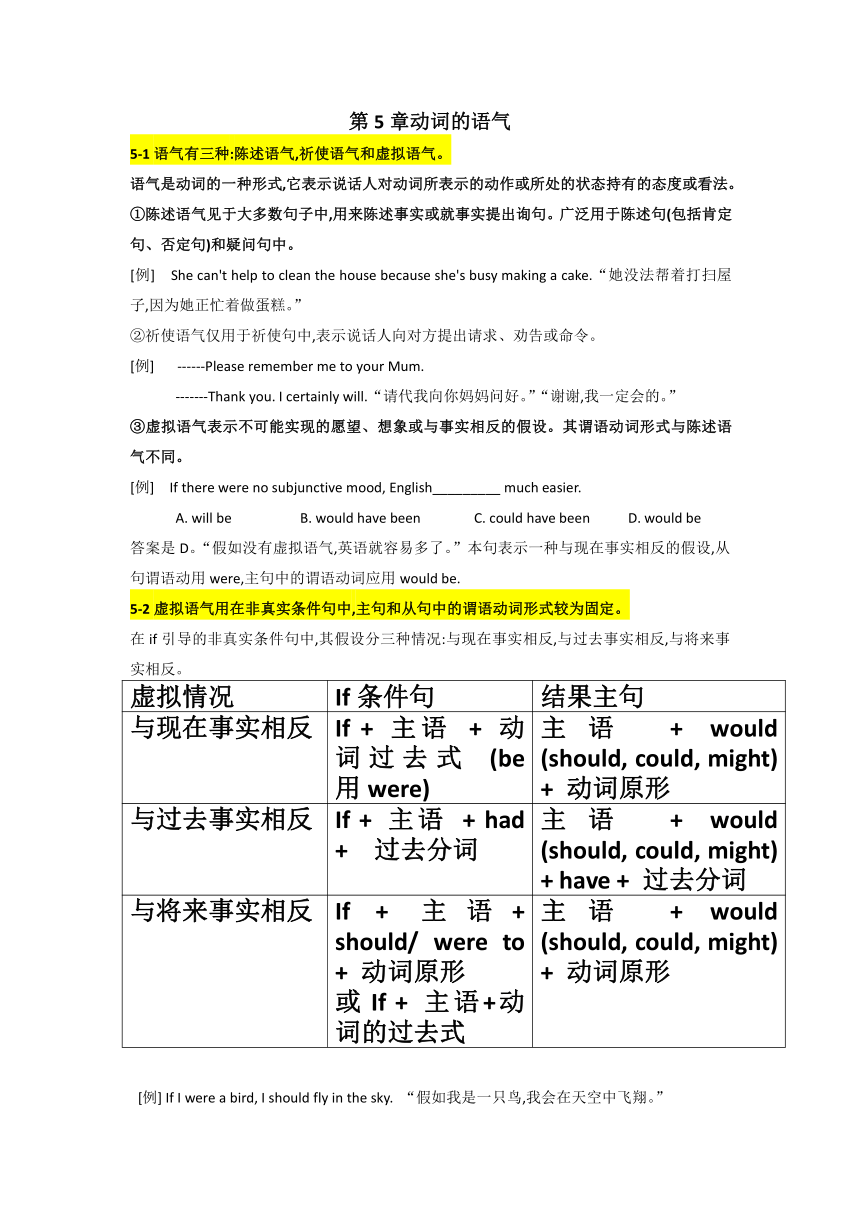
第5章动词的语气 5-1语气有三种:陈述语气,祈使语气和虚拟语气。 语气是动词的一种形式,它表示说话人对动词所表示的动作或所处的状态持有的态度或看法。 ①陈述语气见于大多数句子中,用来陈述事实或就事实提出询句。广泛用于陈述句(包括肯定句、否定句)和疑问句中。 [例] She can't help to clean the house because she's busy making a cake.“她没法帮着打扫屋子,因为她正忙着做蛋糕。” ②祈使语气仅用于祈使句中,表示说话人向对方提出请求、劝告或命令。 [例] --Please remember me to your Mum. --Thank you. I certainly will.“请代我向你妈妈问好。”“谢谢,我一定会的。” ③虚拟语气表示不可能实现的愿望、想象或与事实相反的假设。其谓语动词形式与陈述语气不同。 [例] If there were no subjunctive mood, English_____ much easier. A. will be B. would have been C. could have been D. would be 答案是D。“假如没有虚拟语气,英语就容易多了。”本句表示一种与现在事实相反的假设,从句谓语动用were,主句中的谓语动词应用would be. 5-2虚拟语气用在非真实条件句中,主句和从句中的谓语动词形式较为固定。 在if引导的非真实条件句中,其假设分三种情况:与现在事实相反,与过去事实相反,与将来事实相反。 虚拟情况 If条件句 结果主句 与现在事实相反 If + 主语 + 动词过去式 (be 用were) 主语 + would (should, could, might) + 动词原形 与过去事实相反 If + 主语 + had + 过去分词 主语 + would (should, could, might) + have + 过去分词 与将来事实相反 If + 主语+ should/ were to + 动词原形 或If + 主语+动词的过去式 主语 + would (should, could, might) + 动词原形 [例] If I were a bird, I should fly in the sky. “假如我是一只鸟,我会在天空中飞翔。” 事实上,这是一个表示与现在事实相反的假设,即: 我不是鸟,我也不会在天空中飞翔。 [例If he _____, he_____ that food. Luckily, he was sent to the hospital immediately. A. was warned; would not take B. had been warned; would not have taken C. would be warned; had not taken D. would have been warned; had not taken 答案是B。“假如有人警告他那食物不能吃,他就不会吃了。幸好他被立即送到了医院。”此句表示与过去事实相反的假设,条件从句中的动词应用“had+过去分词”形式,而且这里应用被动结构;主句中的动词须用 would + have + 过去分词”的形式。 5-3在if引导的非真实条件句中,if可以省略,但需用倒装结构。 如if从句中 were, had, should时,可将它们提到主语之前,并将if 省略,而且省略if的从句一般置于主句之前。 [例] Had he been worried, he would not have taken that food.(由5-2的例句变来) [例] Should the earth stop turning, what would happen或 Were the earth to stop turning, what would happen (由5-2的例句变来)若将原题 would stop改为 stopped,则此句不可变为 Stopped the earth turning, what would happen 5-4虚拟语气可不用if从句表条件,而用介词 without, but for等或连词otherwise等表示一种含蓄条件。 [例] Without electricity human life _____ quite differently today. A.is B. will be C. would have been D. would be 答案是D。“如果没有电,今天人类的生活会完全不一样。”句中, without引起的介词短语相当于if条件“ there were no electricity.” [例] Jack can't have arrived yet; otherwise he would have telephoned me. “杰克还不可能到达,要不,他早就给我打电话了。” 在这里, otherwise隐含“if he had arrived这个表示与过去事实相反的假设, 而且前句“Jack can’t have arrived ... ...
~~ 您好,已阅读到文档的结尾了 ~~